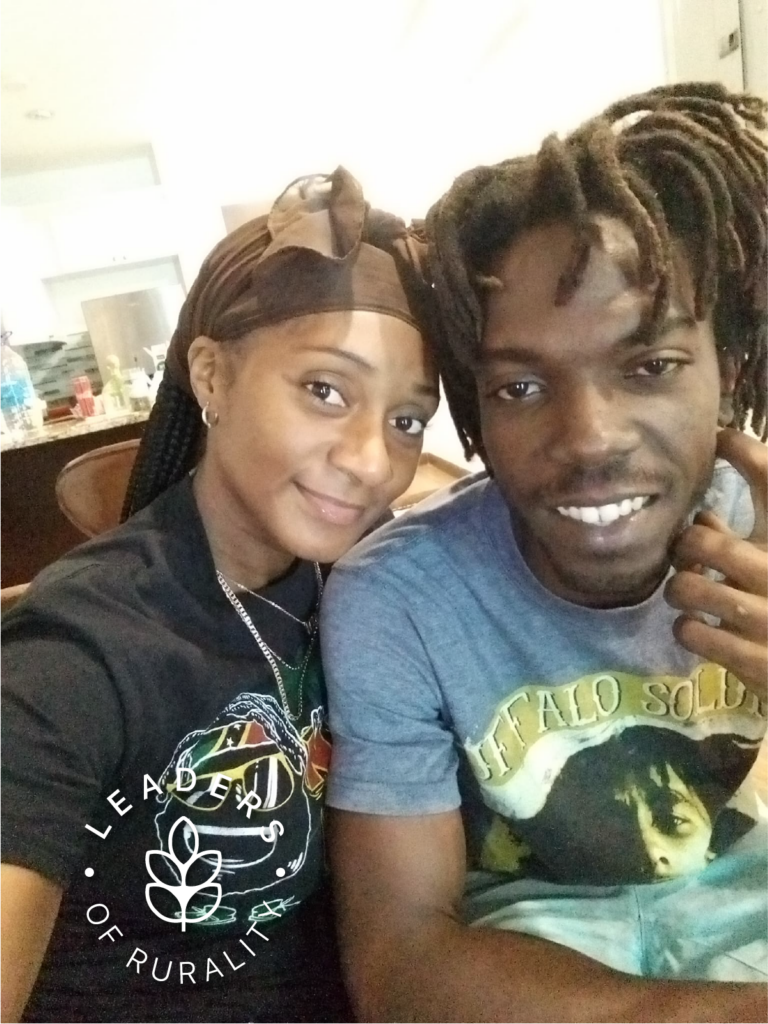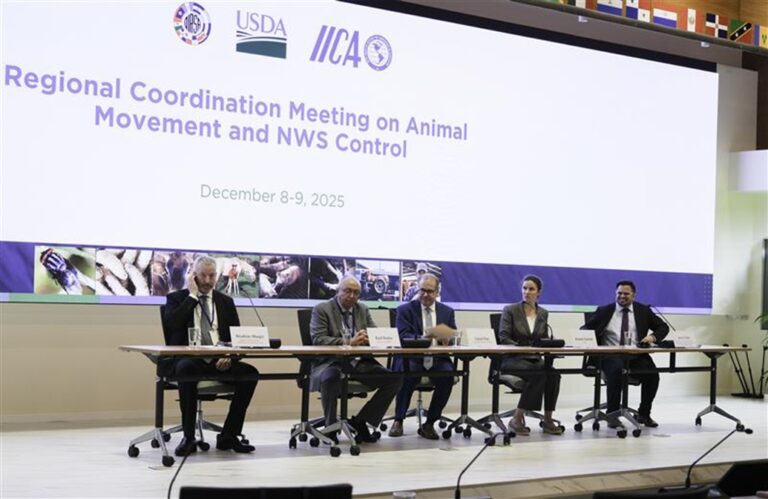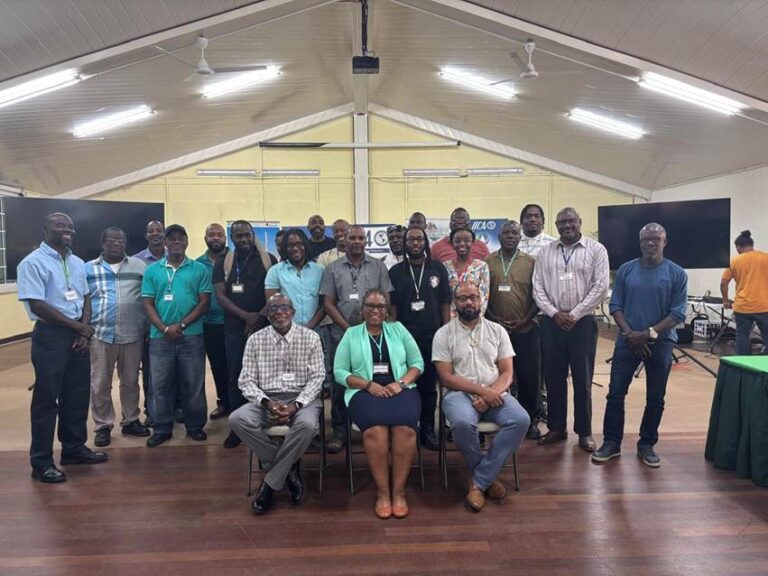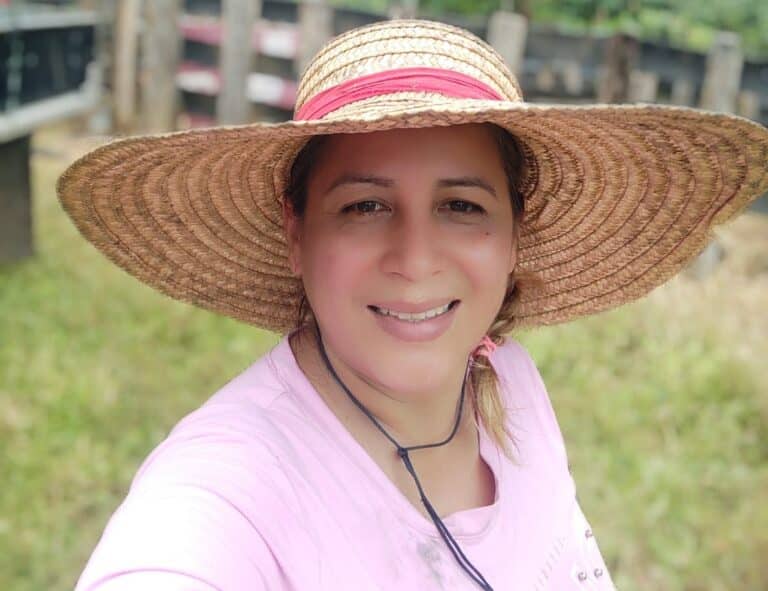
San José, 7 May 2025 (IICA) – Entrepreneurs Akiesha Fergus and Ryan Khadou, a young couple from Saint Kitts and Nevis who are passionate about the countryside, have been recognized by the Inter-American Institute for Cooperation on Agriculture (IICA) as Leaders of Rurality of the Americas who are proving that agricultural production can be a great life choice for the younger generations.
For Akiesha, it all started with a smoothie shop in a rural area of the Caribbean island of Nevis. Since 2019, her business KL Blends has served mostly students from the Medical University of the Americas, who she says “love the fact that they can stay healthy while away from home” by drinking her famous smoothies, knowing that “a healthy brain is a good brain”.
Her entrepreneurial spirit led her to realize that her income could grow significantly if she expanded her business chain. Since her main ingredients—fruits and vegetables—often vary in price depending on the season, she thought: why not grow them herself?
The idea of moving to the start of the natural cycle—from soil to smoothie—gained strength during the COVID-19 pandemic, which forced her to temporarily close her store.
Kept away from her business for several months, 30-year-old Akiesha took charge of a two-acre farm (which may soon expand, she hinted), where she and her partner Ryan, 33, began growing bananas, watermelons, and spinach. Today, they also grow okra, pineapples, peppers, pumpkins, and melons, with the aim of supplying high-quality products to her reopened smoothie shop, which is thriving again in the aftermath of COVID.

Akiesha’s long-standing organic awareness, put the couple on a path to this virtuous cycle of crop production, environmental stewardship, and healthy smoothie sales
Akiesha and Ryan—proud parents of little Lyon—have embraced farming as a way of life, proudly calling themselves a rural couple. “Most young people don’t go into agriculture”, Khadou admits, “but for us it’s a necessity”.
Working in agriculture, Ryan says, may not be as flashy as being a banker, mechanic, bartender, or other jobs “where you get to wear nice clothes”. It’s also hard work, often involving complex trial-and-error processes. “I don’t think everyone likes the ‘growing pains’ that come with life on the land”, he says.
That, says Akiesha, is one of the main reasons why many young people don’t take up rural production. “But agriculture is beautiful”, she exclaims in the interview, “it’s wonderful to see a seed turn into a little plant, then a flower, and finally a fruit… it’s amazing” to witness these small, constant miracles of nature.
It is also fascinating “to understand that when we put nutrients in the soil, harvest the food, and consume it, those nutrients enter our bodies”, emphasizes the Nevis entrepreneur. “It makes me feel good to be a farmer, because I know I’m giving nutrients to other people when they eat what we grow”.
Ryan, who was born in Antigua and Barbuda and lived on his grandfather’s farm as a child, says that meeting Akiesha and working the land together “was definitely a chance to do something I love”.
When asked if they see themselves as role models for other young people, Khadou says that in Nevis, “people come up to us and ask how we do it”, meaning how we manage to run a successful farm. “For me, agriculture is like a science—I’m really interested in innovation, in exploring new technologies”, he adds. “I see us as pioneers”, says Lyon’s dad, “a beacon showing people how to bring in innovative tools that make agriculture more appealing—not just hard, sweaty labor”.
“Our motto”, Akiesha adds, “is ‘work smart’”—because there’s no need to work as hard as people did decades ago. “It’s about science and technology, about getting better crop results” with those new tools and “understanding the environment and the land”. Her partner says another of their core values is sharing knowledge and experiences with others.
On that note, the Antigua-born grower emphasizes that all experiences are valuable. If things go well on their farm, there’s no reason not to share the “formula” with others. And if results fall short, “then we can tell other farmers, ‘look, if you do it this way, it might not work.’”
To develop the skills and knowledge they now readily pass on to younger people, Akiesha and Ryan had help from experienced farmers in their community. Ryan shares a story from when they had just bought greenhouse equipment and passed by a farm with greenhouses that were already up and running. They stopped, knocked on the door, and asked for advice. The welcome, he recalls, was overwhelming—the fellow farmer showed them around and taught them valuable tips that helped bring their project to life.
“The relationship I have with some of the older farmers is very special to me”, says Akiesha, who feels especially grateful to one person in particular “who shaped me into the farmer I am today”. If anyone thinks older generations “don’t want to see young people thrive, they’re very wrong”, she stresses.
“They want to see us reach new levels. And in our case, we have some farmer friends we can call anytime for advice”, Akiesha adds.
Ryan’s childhood on his grandfather’s farm in Antigua and Barbuda, combined with Akiesha’s long-standing organic awareness, put the couple on a path to this virtuous cycle of crop production, environmental stewardship, and healthy smoothie sales. Looking ahead, Fergus says some of her goals include “being recognized as a holistic person” who promotes healthy eating, cares about well-being, and is committed to its benefits. Also, why not be seen as a respected farmer and “be featured in magazines” as someone with “a passion that will never stop”.
Ryan, too, has goals: to expand the farm (“two acres becoming four, then six”), and to grow “opportunities to share knowledge and help others, to lead by example”.
The setting, he says, couldn’t be better: in Nevis, “you can be at the top of a mountain and in ten minutes get to the beach to relax”. The island, he adds, “is small, but has the best of both worlds—it is blessed”.

Working in agriculture, Ryan says, may not be as flashy as being a banker, mechanic, bartender, or other jobs “where you get to wear nice clothes”. It’s also hard work, often involving complex trial-and-error processes.
More information:
Institutional Communication Division.
comunicacion.institucional@iica.int











